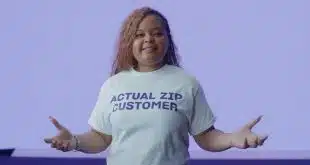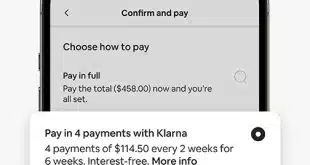By Jim Daly
Square Inc. on Monday introduced a business-oriented version of its Square Cash person-to-person payments service aimed at displacing checks. The merchant processor also unveiled so-called “$Cashtags,” which Square touts as a simple and fast way for people to get paid through Square Cash.
Dubbed Cash Pro for Business, the new service charges 1.5% for payments versus 2.75% for swiped transactions using Square’s regular credit and debit card processing services for smart phones and tablet computers. In announcing the new Cash Pro service, Square singled out checks, whose usage is declining less rapidly at businesses than with consumers.
“Individuals aren’t the only ones who don’t like checks,” Brian Grassadonia, Square Cash lead, wrote in a post on Square’s Web site. “They’re inconvenient for businesses too, whether you’re a landlord, a lawyer, a dogwalker, or an interior decorator. We think everyone should have access to a fast, affordable way to get paid, without the inconvenience or lack of security of cash and paper checks.”
To use Cash Pro for Business, a merchant downloads the Square Cash app from Apple Inc.’s iTunes App Store or Google Inc.’s Google Play store for Android mobile devices and selects the business option. Like the consumer service, a Cash Pro for Business user must first provide a debit card number, its verification code, and billing ZIP code. Users also must verify their legal name, date of birth, and the last 4 digits of their Social Security numbers. Payments are deposited into the bank account linked to the debit card.
The new Cash Pro user enters a display name, which his customers will see on their mobile devices or online when paying the business via Square Cash. In addition to Square Cash’s traditional ways of paying, by entering an email address or mobile phone number for text-message payments, the user can now set up a $Cashtag, a unique identifier that enables the payment receiver to be paid without the receiver providing other identifying information. $Cashtags, which also are available to consumers for P2P payments, start with the dollar sign, followed by the personalized name of the account holder’s choice. All the payer has to do is type in the payment amount.
A Square spokesperson did not respond to a Digital Transactions News request for an executive interview.
Cash Pro for Business opens some attractive opportunities for Square, but its success is far from guaranteed, according to Rick Oglesby, head of research at Double Diamond Payments Research, Centennial, Colo. Some pluses: The service opens an avenue into the invoice and check-based business-payments market for Square. And, whereas the consumer service is free, Square will get revenues from the business version’s 1.5% discount rate. Offering merchants a debit-only service will be attractive to merchants who want to accept electronic mobile payments but balk at the 2.75% combined credit-debit rate under Square’s core offering, Oglesby notes.
“Small merchants that are in Square’s customer base have normally had to pay full credit card rates even when accepting debit cards, so this solution is taking advantage of the Durbin Amendment to offer less-expensive payment acceptance while still making a strong profit and at the same time minimizing the cannibalization of profits that would happen if the cost of debit acceptance were reduced at the point of sale,” he says. The Durbin Amendment in 2010’s Dodd-Frank Act limits the interchange a large bank can receive from a debit transaction to about 23 cents.
The downside is that using the service requires changes in traditional payment procedures on the part of both consumers and merchants. Payers, for example, must set up a Square Cash account themselves. And merchants must take the time to do their required set-ups, no matter how simple Square makes them.
“The product makes a lot of sense, but it is taking on a two-sided market—it requires significant changes in both consumer and merchant behavior to be successful—which likely means that success will come slowly if at all,” says Oglesby.
Square says Square Cash, introduced in 2013, is processing more than $1 billion in annualized payments.






